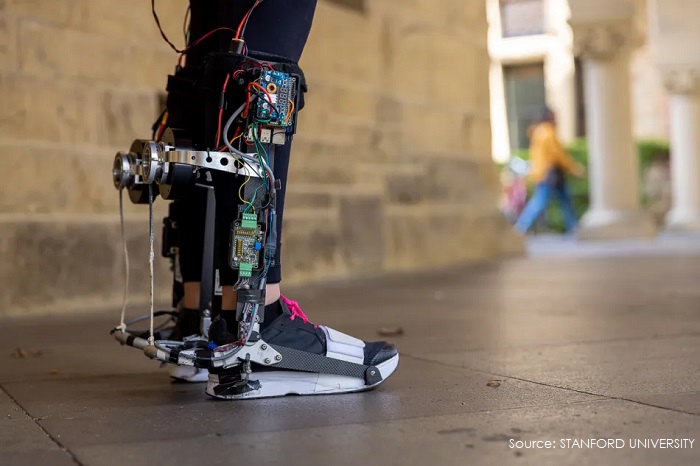Health
Transforming Mobility: The Role of AI in Advanced Exoskeleton Technology

- AI integration in exoskeletons enhances mobility through real-time adaptation and personalized assistance, revolutionizing rehabilitation.
- Interdisciplinary collaboration and ethical considerations are crucial for advancing AI-driven exoskeleton technology responsibly, aiming for inclusive healthcare solutions.
Recent years have seen the interaction between AI with biomedical engineering brought about incredible advances in assistive technologies. Of these and advancements, the integration of AI in exoskeletons is regarded as an exciting development that could change the face of rehabilitation and mobility.
The Evolution of Exoskeleton Technology
Exoskeletons were once restricted to the realms in science-fiction, but are now evolving into advanced biomechanical devices created to boost our strength and mobility. They were originally designed to be used in industrial and military applications Exoskeletons of the present have entered rehabilitation and healthcare settings which offer hope for people with mobility issues.
Traditionally exoskeletons were based on mechanical actuators as well as rigid frameworks to aid and support the human body’s movement. Although effective at providing physical aid, initial designs were not able to adapt and user-friendliness. This limited their wide-spread use. In recognition of these issues, scientists explored ways of integrating AI in exoskeletons, to improve their effectiveness and responsiveness.
The Role of AI in Enhancing Exoskeletons
AI can be described as a paradigm shift in the field of exoskeleton technology that allows exoskeletons to offer more than simple mechanical assistance. With the help of advanced algorithms and machine-learning capabilities, exoskeletons powered by AI can recognize and respond to wearer’s movements in real time. This enables greater fluidity and natural interactions between the wearer’s body and the machine, replicating the complexities of human biomechanics, but with a dazzling accuracy.
The adaptability of AI allows exoskeletons to detect the intent of users by adjusting the torque and levels of assistance accordingly. This flexibility not only increases mobility, but it also decreases physical stress placed on the user and makes long-term use more comfortable and long-lasting. These advancements are especially beneficial to those who undergo rehabilitation or suffering from conditions that limit mobility. This will give an increase in independence and a higher level of living.
Advancements in AI and Biomechanics
Recent advances that have been made in AI and biomechanics have opened the way for new applications in rehabilitation and health. Researchers are studying the ways in which AI can improve rehabilitation strategies through personalizing the treatment plan based on patient information. In analyzing movements patterns and the progress of rehabilitation, AI algorithms can recommend changes to the exoskeleton’s settings, which will result in more efficient therapy sessions and quicker recovery times.
Additionally, AI-driven exoskeletons have been helping to advance research into neurorehabilitation. The precise control and feedback systems can be crucial to restoring motor function for patients suffering from disabilities in the brain or spinal cord injury. Exoskeletons offer a potential way to increase neuroplasticity, the brain’s capacity to change its structure and build new neural connections – through specifically designed rehabilitation programs that are aided with AI-guided feedback.
Ethical Considerations and Future Directions
Since AI is continuing to play an important aspect in the advancement of technology for exoskeletons, ethical concerns about privacy, data security as well as equitable access to data must be considered. Scientists and policymakers are currently looking for ways to make sure that there is an ethical development and implementation of AI-driven health technologies, such as exoskeletons.
The future of AI-driven exoskeletons looks promising as ongoing research continues to further improve and enhance the capabilities of these devices. In addition to assisting people handicapped to aiding the elderly in retaining the independence they enjoy, AI exoskeletons hold potential application across a variety of demographics and health care contexts.
“As we continue to innovate, our goal is to empower individuals to live life to the fullest,” remarks Dr. Sarah Chen. “AI-driven exoskeletons represent a convergence of technology and humanity, offering new possibilities for enhancing mobility and improving quality of life.”
As technology advances and research develops, AI-powered exoskeletons could revolutionize the rehabilitation process and health care as we move towards a time that combines innovation with compassion in order for a more inclusive society.

















































